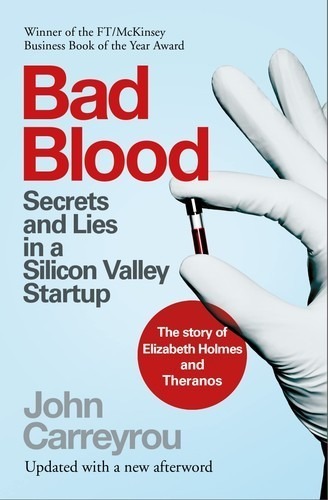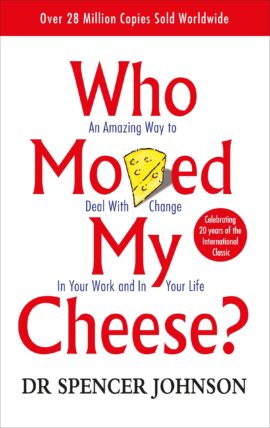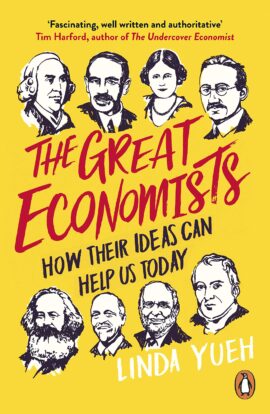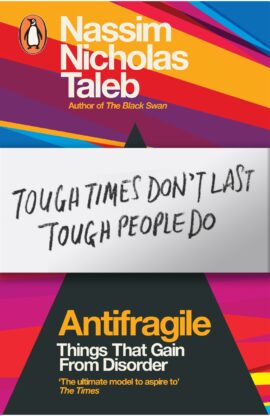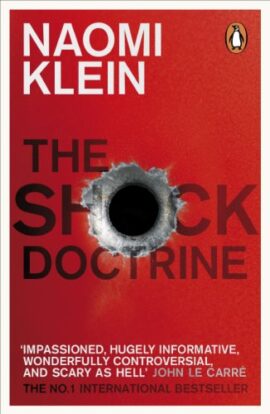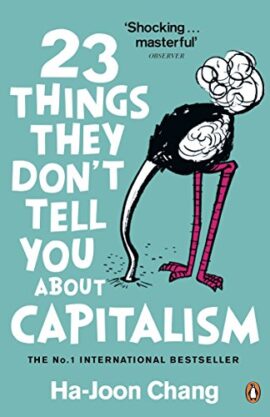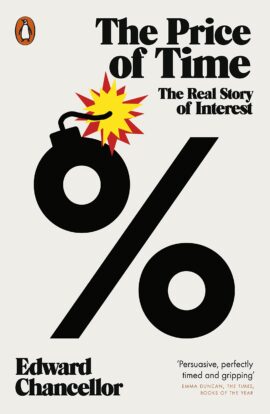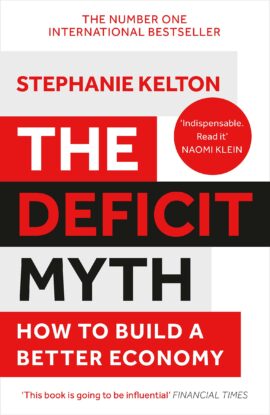«Working Hard, Hardly Working» a été ajouté à votre panier. Voir le panier
Bad Blood: Secrets and Lies in a Silicon Valley Startup: The Story of Elizabeth Holmes and the Theranos Scandal
2.500,00 د.ج
5
Items sold in last 3 days
Félicitation ! vous bénéficiez d'une livraison gratuite !
1
People watching this product now!
Estimated delivery dates: septembre 24, 2025 – octobre 1, 2025
Catégorie : Business
Informations complémentaires
| Editeur |
|---|
Produits similaires
Leading from Purpose: Clarity and the Confidence to Act When It Matters Most
2.070,00 د.ج
Cheese is a metaphor for what you want in life - be it a good job, a loving relationship, money or possessions, health or spiritual peace of mind. And the maze is where you look for what you want - the organization you work in, or the family or community where you live. This book shows how to anticipate change, adapt quickly, enjoy the change and be ready for more, so that you suffer from less stress and enjoy more success in life.
Great Economists
2.530,00 د.ج
A Times Best Business Book of 2018What can the ideas of history's greatest economists tell us about the most important issues of our time?'The best place to start to learn about the very greatest economists of all time' Professor Tyler Cowen, author of The Complacent Class and The Great StagnationSince the days of Adam Smith, economists have grappled with a series of familiar problems - but often their ideas are hard to digest, before we even try to apply them to today's issues. Linda Yueh is renowned for her combination of erudition, as an accomplished economist herself, and accessibility, as a leading writer and broadcaster in this field: and in The Great Economists she explains the key thoughts of history's greatest economists, how their lives and times affected their ideas, how our lives have been influenced by their work, and how they could help with the policy challenges that we face today.In the light of current economic problems, and in particular economic growth, Yueh explores the thoughts of economists from Adam Smith and David Ricardo through Joan Robinson and Milton Friedman to Douglass North and Robert Solow. Along the way she asks, for example: what do the ideas of Karl Marx tell us about the likely future for the Chinese economy? How does the work of John Maynard Keynes, who argued for government spending to create full employment, help us think about state investment? And with globalization in trouble, what can we learn about handling Brexit and Trumpism?In one accessible volume, this expert new voice provides an overarching guide to the biggest questions of our time.The Great Economists includes:Adam SmithDavid RicardoKarl MarxAlfred MarshallIrving FisherJohn Maynard KeynesJoseph SchumpeterFriedrich HayekJoan RobinsonMilton FriedmanDouglass NorthRobert Solow'Economics students, like others, can learn a lot from this book' - Professor Paul Collier, author of The Bottom Billion'Not only a great way to learn in an easily readable manner about some of the greatest economic influences of the past, but also a good way to test your own a priori assumptions about some of the big challenges of our time.' - Lord Jim O'Neill, former Chairman at Goldman Sachs Asset Management, former UK Treasury Minister, and author of The Growth Map'An extremely engaging survey of the lifetimes and ideas of the great thinkers of economic history.' - Professor Kenneth Rogoff, author of The Curse of Cash and co-author of This Time is Different'This book is a very readable introduction to the lives and thinking of the greats.' - Professor Raghuram Rajan, former Governor of the Reserve Bank of India, and author of I Do What I Do and Fault Lines'Read it not only to learn about the world's great economists, but also to see how consequential thought innovations can be, and have been.' - Mohamed el-Erian, Chief Economic Adviser at Allianz, former CEO of PIMCO
Antifragile
2.990,00 د.ج
Paperback. Pub Date :2013-06-06 Pages: 544 Language: English Publisher: Penguin Books The hottest thinker in the world Bryan Appleyard. Sunday TimesIn The Black Swan. Taleb showed us that highly improbable and unpredictable events underlie almost everything about our world ... Here Taleb stands uncer-tainty on its head. making it desirable. even necessary The antifragile is beyond the resilient or robust The resil-ient resists shocks and stays the same: the antifragile gets better and better.Just as human bones get stronger when subjected to stress and tension. many things in life benefit from stress. disorder. volatility. and turmoil. What Taleb has identified and calls antifragile are things that not only gain from chaos but need it in order to survive and flourish.Whats more . the antifragile is immune to prediction errors and protected from adverse events. Why is the cit...
The Shock Doctrine: The Rise of Disaster Capitalism
3.450,00 د.ج
Around the world in Britain, the United States, Asia and the Middle East, there are people with power who are cashing in on chaos: exploiting bloodshed and catastrophe to brutally remake our world in their image. They are the shock doctors. Thrilling and revelatory, "The Shock Doctrine" cracks open the secret history of our era. Exposing these global profiteers, Naomi Klein discovered information and connections that shocked even her about how comprehensively the shock doctors' beliefs now dominate our world - and how this domination has been achieved. Raking in billions out of the tsunami, plundering Russia, exploiting Iraq - this is the chilling tale of how a few are making a killing while more are getting killed.
23 Things They Don’t Tell You about Capitalism
2.530,00 د.ج
Ha-Joon Chang's 23 Things They Don't Tell You About Capitalism turns received economic wisdom on its head to show you how the world really works.In this revelatory book, Ha-Joon Chang destroys the biggest myths of our times and shows us an alternative view of the world, including:There's no such thing as a 'free' marketGlobalization isn't making the world richerWe don't live in a digital world - the washing machine has changed lives more than the internetPoor countries are more entrepreneurial than rich onesHigher paid managers don't produce better resultsWe don't have to accept things as they are any longer. Ha-Joon Chang is here to show us there's a better way.'Lively, accessible and provocative ... read this book'Sunday Times'A witty and timely debunking of some of the biggest myths surrounding the global economy'Observer'The new kid on the economics block ... Chang's iconoclastic attitude has won him fans'Independent on Sunday'Lucid ... audacious ... increasingly influential ... will provoke physical symptoms of revulsion if you are in any way involved in high finance'Guardian'Important ... persuasive ... an engaging case for a more caring era of globalization'Financial Times'A must-read ... incisive and entertaining'New Statesman Books of the YearHa-Joon Chang is a Reader in the Political Economy of Development at the University of Cambridge. He is author of Kicking Away the Ladder: Development Strategy in Historical Perspective, which won the 2003 Gunnar Myrdal Prize, and Bad Samaritans: Rich Nations, Poor Policies and the Threat to the Developing World. Since the beginning of the 2008 economic crisis, he has been a regular contributor to the Guardian, and a vocal critic of the failures of our economic system.
The Price of Time
1.950,00 د.ج
*Longlisted for the 2022 Financial Times Business Book of the Year Award*All economic and financial activities take place across time. Interest coordinates these activities. The story of capitalism is thus the story of interest: the price that individuals, companies and nations pay to borrow money.In The Price of Time, Edward Chancellor traces the history of interest from its origins in ancient Mesopotamia, through debates about usury in Restoration Britain and John Law ' s ill-fated Mississippi scheme, to the global credit booms of the twenty-first century. We generally assume that high interest rates are harmful, but Chancellor argues that, whenever money is too easy, financial markets become unstable. He takes the story to the present day, when interest rates have sunk lower than at any time in the five millennia since they were first recorded - including the extraordinary appearance of negative rates in Europe and Japan - and highlights how this has contributed to profound economic insecurity and financial fragility.Chancellor reveals how extremely low interest rates not only create asset price inflation but are also largely responsible for weak economic growth, rising inequality, zombie companies, elevated debt levels and the pensions crises that have afflicted the West in recent years - conditions under which economies cannot possibly thrive. At the same time, easy money in China has inflated an epic real estate bubble, accompanied by the greatest credit and investment boom in history. As the global financial system edges closer to yet another crisis, Chancellor shows that only by understanding interest can we hope to face the challenges ahead.
The Deficit Myth: Modern Monetary Theory and How to Build a Better Economy
2.990,00 د.ج
THE INTERNATIONAL BESTSELLER'Kelton has succeeded in instigating a round of heretical questioning, essential for a post-Covid-19 world, where the pantheon of economic gods will have to be reconfigured' Guardian'Stephanie Kelton is an indispensable source of moral clarity ... the truths that she teaches about money, debt, and deficits give us the tools we desperately need to build a safe future for all' Naomi Klein'Game-changing ... Read it!' Mariana Mazzucato'A rock star in her field' The Times'This book is going to be influential' Financial Times'Convincingly overturns conventional wisdom' New York TimesSupporting the economy, paying for healthcare, creating new jobs, preventing a climate apocalypse: how can we pay for it all? Leading economic thinker Stephanie Kelton, shows how misguided that question is, and how a radical new approach can maximise our potential as a society. Everything that we've been led to believe about deficits and the role of money and government spending is wrong. Rather than asking the self-defeating question of how to pay for the crucial improvements our society needs, Kelton guides us to ask: which deficits actually matter?
